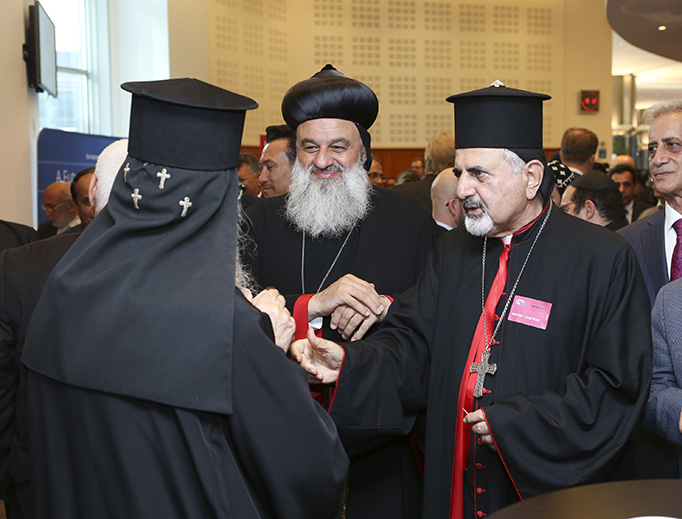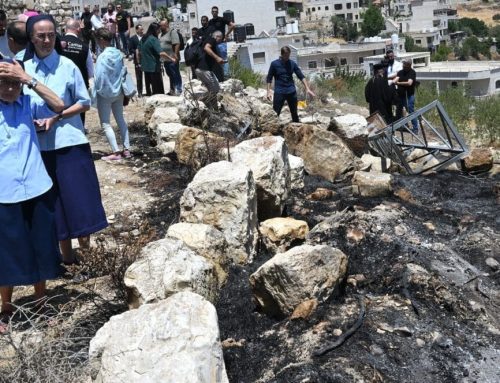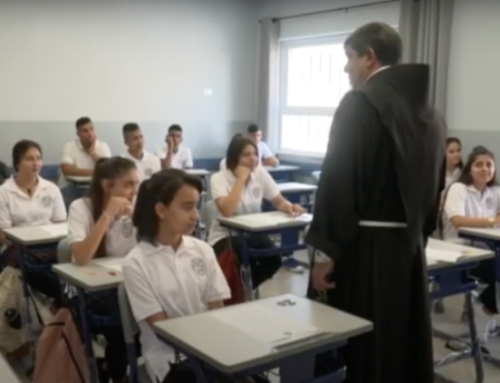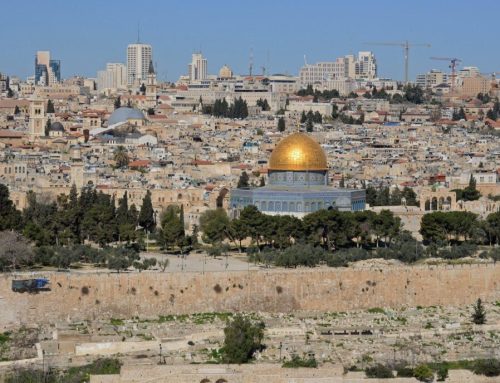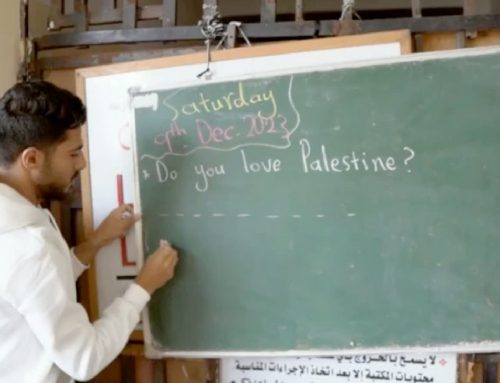Representatives of the Assyrian, Chaldean and Syriac Christian political parties have produced a position paper which outlines their desire to establish self-governance.
In the very land from which Christianity was born, the Faithful have suffered terrible, unspeakable oppression, blatant discrimination, torture and holy martyrdom at the hands of those who reject peace and love.
Now, that the failed “ISIL” is in rapid retreat, having unleashed untold suffering on the region and deaths over the past three-years, plans are in the work to keep the remainder of Christians in the region safe from more unsolicited, gratuitous violence.
A high-level European Parliament meeting in Brussels, entitled “A Future for Christians in Iraq” discussed the possibility of offering the remnant of Christians who have withstood one of the worst threats to the Faith’s existence since its inception.
Representatives of the Assyrian, Chaldean and Syriac Christian political parties produced a position paper which outlines their desire to establish self-governance.
On January 21, 2014, the Iraq Council of Ministers approved a plan to establish three new provinces in Iraq. One province would be in Fallujah, in central Iraq; a second would be in north Iraq, in Tuz Khormato; the third would also be in north Iraq, in the Nineveh Plain. This last region would be a safe haven for persecuted minorities including Christians.
A few months after this meeting, Islamic terrorist organization “ISIS” invaded Mosul, Iraq’s second largest city claiming it as the capital of their new capital in the misguided attempt at reviving a “caliphate” which had been disbanded in the early part of the 20th century by Mustafa Kemal (Atatürk), the President and Founder of the modern Turkish state. Atatürk is also known for engineering and/or encouraging the Armenian Genocide which slaughtered two million Christians, including a great number of Catholics. Historians label this attack as the 20th century’s first genocide and served as the inspiration for the Shoah.
A few weeks after this fateful meeting, the Nineveh Plain, which that had the largest population of Assyrians/Chaldeans/Syriacs, was also invaded. ISIS had threatened to completely eradicate Christianity in Iraq, as well as other religious and ethnic minorities such as Yazidis, Shabaks and Turkmens. The Iraqi army and the Kurdish Peshmerga abandoned the Nineveh Plain. Hundreds of thousands fled the area, which was completely emptied in just a few days. Others were kidnapped. Children, both boys and girls, were sold as sex slaves. Elderly Christians, non-combatants, children, pregnant women were raped, enslaved, forced to apostatize and mercilessly slaughtered in the name of a religion of peace while the secularists of the world looked on with apathetic bemusement. Admittedly, many governments around the world, including the European, British and U.S. Congress, have acknowledged that the persecution fulfills the UN resolution criteria for genocide.
Charlie Weimers, chief of staff for Member of the European Parliament Lars Adaktusson, a Swedish representative, organized the recent event on behalf of Mr. Adaktusson. He also was part of an exploratory committee to some recently liberated towns and villages of the Nineveh Plain the delegation drove back to Ankawa, outside Erbil, to meet representatives from political parties of Assyrian/Chaldean/Syriac Christians.
“They supported the resolution which had passed in the European Parliament and they asked us to host an international conference to highlight the plight of victims of genocide,” explained Weimers. “They all signed a letter; all the ten major Christian parties.”
A week prior to the conference, the Assyrian Democratic Movement along with two other political parties along with two churches pulled out of the conference. The parties’ organizers were accused of promulgating a “Kurdish agenda” and hoping to get “the Nineveh Plain annexed to the Kurdistan region of Iraq”. The accusations were based on a draft of the policy position paper.
The overwhelming majority of the attendees to the conference wholeheartedly agreed that the only viable solution for Christians in the region was a self-governing province. They referred to the Iraqi constitution and the right to establish a region in the Nineveh plain with their own police force, security force, healthcare and education and justice system.
The Kurdish regional government’s representative Hoshyar Siwaily, who also heads the foreign relations office of the Kurdish Democratic Party (KDP), said in his speech that it’s entirely up the people to decide whether they want to join KRG or self-govern within Iraq.
Adaktusson announced in his final presentation said, “Today, ISIS was declared defeated by the Iraqi government. This adds to this historical moment.”
After the political parties present at the conference signed the policy position paper, Iraqi representatives invited Adaktusson to visit Baghdad in the fall and thanked him for having succeeded in making them cooperate and amend their final demands for the Nineveh Plain. They also voiced their mutual concern for those political parties which had pulled out of the conference hoping they will cooperate at a future time.
Representative of the Iraqi Government and the European Delegation for Iraq were both present at this conference.
Charlie Weimers, chief of staff for Member of the European Parliament Lars Adaktusson and a recent convert to Catholicism, spoke to the Register about the hopeful impact of this recent conference:
What is the state of reality for Middle Eastern Christians?
It is a very harsh reality for most of the Christians of the Middle East. In some cases, they find themselves stuck in the middle of conflicts between more powerful actors. This together with the persecution by islamist groups such as ISIS, the Nusra Front and Al-Qaida poses a grave if not existential threat. In Iraq, the amount of Chaldeans/Syriacs/Assyrians (Christians) has decreased from 1.5 million in 2003 to approximately 300,000 today.
What was your initial involvement with the process of assisting Middle Eastern Christians?
Some of my first encounters with the tragic fate of Middle Eastern Christianity was during my tenure as Chairman of the Swedish Young Christian Democrats. I spoke at rallys demanding the recognition of the mass murders in 1915 against Armenians, Syriacs/Assyrians/Chaldeans and Pontic Greeks as genocide. We already had started working with the issue when ISIS overran northern Iraq. It was immediately clear to me that they were there to finish what started 99 years earlier and that something had to be done to prevent such an irreversible and unforgivable disaster.
How did it get so bad for the Christians of the Middle East?
ISIS fulfilled their ideology that for a decade tried to eradicate both the religious and the ethnic existence of the Assyrian/Chaldeans/Syriacs. Churches and monasteries were destroyed along with ancient Assyrian and Babylon cities in Mosul and the Nineveh Plain. They also destroyed Muslim (both Sunni and Shia) mosques and Yazidi temples. A full scale genocide took place.
What is the solution that your discussion group is considering?
The background is that the European Parliament last fall decided to support self-governance for Chaldeans/Syriacs/Assyrians and other nationalities of the Nineveh Plain in northern Iraq. Ever since, we (the office of Lars Adaktusson MEP together with our partners) have been working together to support Iraqi Christian political parties and NGOs to establish an own roadmap for reconstruction, security and self-governance. Let me emphasize that this is far more than a discussion group. This is a serious political effort backed by the largest European political party (the EPP) as well as Members of European Parliament from all major political groups and major NGO’s in the field. I should also add that in the US, there have also been efforts for self-governance such as the resolution on a “Nineveh Plain Province”, tabled by Congressman Jeff Fortenberry (R-NE) with support from The Philos Project, In Defense of Christians and the Institute for Global Engagement.
How does one go about such a monumental task?
During a conference in Brussels hosted by Lars Adaktusson MEP together with co-hosts from all major European party groups, a majority of the Iraqi Christian parties negotiated a position paper that spells out how they themselves can contribute to the realization of the Iraqi government’s decision of 21 January 2014 to make the Nineveh Plain a province/governorate. They stand ready to form an interim council and the NGOs have documented and put a price tag on the destruction of private property and business of all inhabitants of the area.
How do you propose implementing your plans?
The position paper, which can be downloaded from www.nineveh.eu, signed by the seven Iraqi Christian political parties present in Brussels is in strict accordance with the Iraqi constitution. The constitution is federalist, and there is a legal path for Nineveh Plains to not only become a province/governorate, something that already has been promised by the Iraqi government, but also to become a region would the population want it. The Iraqi ambassador to the EU Dr. Jawad al-Hindawy, who was present at the conference on request by Prime Minister Al-Abadi, stressed during his speech the federalism of the constitution, and that de-centralization could go even further than establishing a province/governorate. The EU and the US could play a positive role in terms of pushing for equal treatment of all nationalities of Iraq, enabling a dialogue between stakeholders in northern Iraq as well as capacity support for local administrations and financial support for reconstruction.
What was the general mood among the participants in the conference you organized?
The conference ended with a standing ovations for the representatives who signed the policy position paper. These are those people who helped to implement the request for an international conference, the governments which supported it and Parliamentarian Adaktusson. The political parties also made it clear that they “don’t want a Berlin wall in the Nineveh Plain” meaning that the parties who have signed will not accept the region to be split between Baghdad and Erbil. Admittedly, Fawzi Hariri, the personal representative of Iraqi president Barzani, KRG, opposed the press release that was read. He claimed that he was disappointed with it since KRG wasn’t specifically thanked saying, “The Iraqi government will not do anything for you, so yes we are disappointed with the wording. If you are willing to make a statement and thanking the Iraqi government you should also thank the Kurdistan regional government.“
What are the considerations of infrastructure, including a self-defense force for the proposed new province?
In order to avoid any confusion, it is important to stress that the Iraqi constitution provides for the establishment of geographical (not ethno-religious) provinces/governorates, which could be compared with US counties. All nationalities of the Nineveh Plain, such as Chaldeans/Syriacs/Assyrians, Armenians, Yazidis, Kaka’i, Shabaks and others would thus be part of a local self-governance. The higher level is the establishment of a region, which could be compared with a US state. A region has the constitutional responsibility for police, security forces, and guards of the region, which would make it possible for the nationalities of the Nineveh Plain to organize self-defense within the framework of the Iraqi army. Please allow me to clarify that for the US audience the word ‘state’ means something else than for the Iraqi audience. Nowhere the signed position paper advocates for a new country. It asks for a new governorate/province in Iraq with the possibility to evolve to a region, all as defined in the Iraqi constitution. Actually before the ISIS invasion the Iraqi Government already made the decision to create such a Nineveh Plain province/governorate.
What is the involvement of the native Christians who would be the first beneficiaries of such a new province, in the discussions for such a proposed new entity?
The position paper that states the demands for a Nineveh Plain Governorate and later a region is the product of seven of the Iraqi Christian political parties. We have been merely facilitators to ensure that their demands are heard and understood by the EU and US.
What problems do you hope such a new structure would solve or at least address?
Although IDPs and refugees have moved back to some of the Christian villages, it is also clear that many want security guarantees in order to take their families back to their homeland. I believe that many would be more encouraged to return if security could be provided for the people by the people of Nineveh Plain, within the framework of the Iraqi constitution.
What is the proposed size of the population for such a new province?
The administrative and geographic basis should be based upon the 1957 general census. This is actually also defined in the Iraqi constitution. The position paper does not create new borders, it refers to the existing districts in Nineveh Plain. I assume that the first and major group of inhabitants will be the people driven away by ISIS and who want to return.
Is there any consideration as to a name for this proposed region?
“Nineveh Plain Region” is the name used in the position paper of the political parties.
Is there United Nations support for such a venture? Are there other international organizations such as NATO, EU or others that have expressed an interest in supporting such a project? Have there been any naysayers such as OPEC or the Arab League? Have there been any response from Islamic terrorist groups?
The position paper is so recent that formal reactions from the bodies and groups mentioned above are yet to be seen. From our side, we will support this position paper by trying to gather as big an international coalition as possible in support for this. We believe that we as friends of the people of the Nineveh Plain need to push both for urgent financial support for reconstruction and a long term solution that secures equal rights for all nationalities of Iraq.
What can US Catholics and other Christians do to help this venture?
There is one major thing US Catholics and other Christians can do. They can stand up and demand that the US Administration will initiate a donors’ conference for post-war relief and reconstruction for groups who the President himself has labeled as victims of genocide. Time is running out as Christian families are leaving Iraq every week. Moreover, they can urge the US to finally cooperate directly with a united body of the existing security forces of the Chaldean/Syriac/Assyrians of Nineveh Plain such as the NPU, NPF, NPGF and Dwekh Nawsa. We really need to stand up that the US ensures that these people get the security they need and trust. If we don’t stand up for their security as a fundamental human right we fail to support them as they will not feel safe enough for the rebuilding and return. The position paper precisely outlines how this security cooperation could be realized.
Do you have any anecdotes as to the process by which this proposal has come about?
One thing I will I think never forget is how we entered the recently liberated areas in Nineveh Plain and were part of the first Holy Mass led by the Syriac-Catholic Archbishop of Mosul Yohanna Petros Mouche. For me to receive Communion in that desecrated yet re-consecrated cathedral of Qaraqosh was one of the most impressive experiences of my life and keeps me motivated to help this plan become a reality.
Source: ncregister.com

